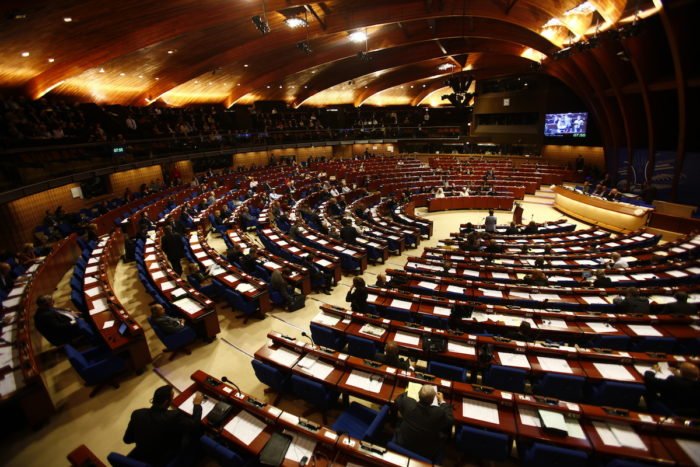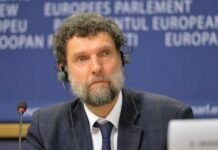The Parliamentary Assembly of the Council of Europe (PACE) Monitoring Committee on Tuesday called on Turkey to postpone its snap presidential and parliamentary elections slated for June 24, stating that “it is impossible to hold genuinely democratic elections under the state of emergency and on-going security operations in south-east Turkey.”
The committee, in a statement on its website on Tuesday, underscored that elections — to be held-one and-a-half years ahead of schedule – “leaves too little time for political parties to adjust and complete their preparations for the election.”
“The amendments to the electoral law were adopted by the parliament only one month prior to calling these snap elections. These amendments substantially change the rules for elections and the election campaign. They include the possibility to form pre-election alliances which was not possible until now,” the committee said.
Pointing out that on the same day Turkish President Recep Tayyip Erdoğan announced the elections, April 18, Parliament approved the seventh extension of the state of emergency put in place after a failed July 2016 coup, the committee pointed out that it was impossible to hold genuinely democratic elections in Turkey’s current state.
“Numerous media have also been closed down or bought up by pro-government businessmen. A newly adopted law has tightened the control of online broadcasting. This has further narrowed the space for democratic debate necessary in an election time, which requires access to full and accurate information so as to ensure the voters’ ability to make informed choices between candidates,” the committee said.
Pointing to provisions in the new electoral system that raise serious questions about election security and transparency and possible interference of the executive in the election administration, the committee expressed its concerns about the possible presence of police forces in polling stations, serving as a deterrent for voters.
“All these factors combined seriously challenge the democratic nature of the elections. The committee thus recommends that the Turkish authorities postpone the elections,” the statement concluded.
Meanwhile, Turkish Prime Minister Binali Yıldırım on Tuesday rebuffed the Council of Europe urging postponement of the nation’s early elections, saying it should “mind its own business.” “The Parliamentary Assembly of the Council of Europe should mind its own business. Turkey will hold the elections, not them,” Yıldırım told a news conference in Spain’s capital of Madrid.
Yıldırım also slammed PACE for inviting the Democratic Union Party’s (PYD) former co-leader Salih Muslim to an event on Monday. “Bringing a terrorist there and letting him give a speech contributes to neither peace nor the values of Europe,” he said.
Meanwhile, Turkey’s Deputy Prime Minister Bekir Bozdağ said on Tuesday that the Council of Europe urging Turkey to postpone its early elections over its state of emergency shows a double standard as no one made an issue of the same situation in France.
“When France held 2017 elections during the state of emergency, PACE didn’t mind election security and didn’t urge France to postpone the elections, but when it comes to Turkey, it brings up the EU criteria, state of emergency and election security, which is meaningful and shows a double standard,” Bozdağ tweeted on Tuesday. Bozdağ called the move “unacceptable” and “interference in Turkey’s internal affairs and elections.”
Turkey’s EU Minister Ömer Çelik also slammed the PACE move, calling it an intrusion in the sovereign decision of Turkish citizens. Calling it “a completely political decision,” Çelik said on Twitter: “Turkey knows how to decide when the elections should be. Nobody has the right to intervene except Turkish citizens and the institutions that represent them.”
The full text of the PACE statement is as follows:
The PACE Monitoring Committee, meeting in Strasbourg today, adopted the following statement on the organisation of early presidential and parliamentary elections in Turkey:
“The Monitoring Committee expresses its deepest concern at the announcement, on 18 April 2018, of the holding of early presidential and parliamentary elections in Turkey on 24 June 2018, one and a half years ahead of schedule.
The committee notes that the amendments to the electoral law were adopted by the parliament only one month prior to calling these snap elections. These amendments substantially change the rules for elections and the election campaign. They include the possibility to form pre-election alliances which was not possible until now. The extremely short period between the adoption of these new rules and the upcoming elections leaves too little time for political parties to adjust and complete their preparations for the elections. Changing the election rules three months before Election Day is contrary to the recommendations of the Venice Commission. At the same time, the Assembly notes, with regret, that the 10 per cent electoral threshold – the highest in Europe – was not lowered in the amended law, as called for by the international community, including the Assembly. This very high threshold will further undermine political pluralism by sidelining single political parties.
The committee deplores that, on the same day the elections were announced, the parliament approved the 7th extension of the state of emergency put in place after the failed July 2016 coup. Echoing the Venice Commission concerns, the committee reiterates that it is impossible to hold genuinely democratic elections under the state of emergency and on-going security operations in south-east Turkey.
The state of emergency has, since July 2016, led to disproportional measures and unacceptable restrictions on fundamental freedoms – in particular freedom of expression, the media, and assembly. It has negatively and disproportionally affected oppositional and critical voices, as highlighted by the Assembly in its Resolution 2156 (2017). The committee regrets that no progress has been achieved since then. A significant number of parliamentarians from the opposition (10), journalists (about 150) and human rights defenders remain in detention, while many other face legal cases on terror-related charges. Many NGOs have been closed down. Numerous media have also been closed down or bought up by pro-government businessmen. A newly adopted law has tightened the control of online broadcasting. This has further narrowed the space for democratic debate necessary in an election time, which requires access to full and accurate information so as to ensure the voters’ ability to make informed choices between candidates.
In addition, several provisions of the new electoral system raise serious questions about election security and transparency and possible interference of the executive in the election administration. The committee is notably worried by the possible presence of police forces in polling stations, which could have a deterrent effect on voters. It is also concerned that the decision to accept non-stamped ballot papers invalidates the use of stamped ballot papers as a major security measure. In addition The committee also regrets that previous and repeated recommendations made by the Parliamentary Assembly, the Group of States against Corruption (GRECO) and the OSCE/ODIHR related to media coverage and funding of electoral campaigns and political parties have remained unaddressed. The Monitoring Committee has therefore decided to seize the Venice Commission for an opinion on the electoral law, as revised in March 2018, and connected legislation.
The Monitoring Committee is deeply concerned that this adverse context will impede the conduct and organisation of genuinely democratic elections, and confirms that, at the end of the process, the overall legitimacy of these elections is at stake. The Monitoring Committee recalls that Turkey should abide by the fundamental values of the Council of Europe, including the holding of free and fair elections. It also recalls that these elections will be crucial; this will be the final step for the shift to an executive presidential system, which will grant extensive powers to the President of the Republic while limiting checks and balances. All these factors combined seriously challenge the democratic nature of the elections. The committee thus recommends that the Turkish authorities postpone the elections.”
















